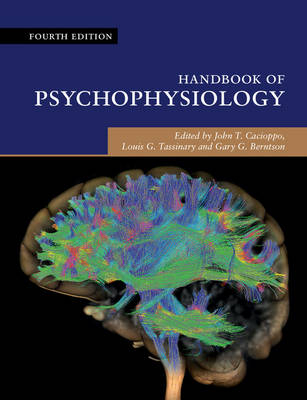
Handbook of Psychophysiology
Cambridge University Press (Verlag)
978-1-107-05852-1 (ISBN)
The Handbook of Psychophysiology has been the authoritative resource for more than a quarter of a century. Since the third edition was published a decade ago, the field of psychophysiological science has seen significant advances, both in traditional measures such as electroencephalography, event-related brain potentials, and cardiovascular assessments, and in novel approaches and methods in behavioural epigenetics, neuroimaging, psychoneuroimmunology, psychoneuroendocrinology, neuropsychology, behavioural genetics, connectivity analyses, and non-contact sensors. At the same time, a thoroughgoing interdisciplinary focus has emerged as essential to scientific progress. Emphasizing the need for multiple measures, careful experimental design, and logical inference, the fourth edition of the Handbook provides updated and expanded coverage of approaches, methods, and analyses in the field. With state-of-the-art reviews of research in topical areas such as stress, emotion, development, language, psychopathology, and behavioural medicine, the Handbook remains the essential reference for students and scientists in the behavioural, cognitive, and biological sciences.
John Cacioppo is the Tiffany and Margaret Blake Distinguished Service Professor and Director of the Center for Cognitive and Social Neuroscience at the University of Chicago. Cacioppo is the author of more than 500 scientific articles and twenty books. Among the awards he has received are the Troland Award from the National Academy of Sciences (NAS), the Award for Distinguished Scientific Contributions from the Society for Psychophysiological Research (SPR), the Distinguished Scientific Contribution Award from the American Psychological Association (APA), the Distinguished Scientific Contribution Award and the Scientific Impact Award from the Society of Experimental Social Psychology (SESP), and the Theoretical Innovation Prize from the Society for Personality and Social Psychology (SPSP). He is a former Editor of Psychophysiology and a past president of the Society for Psychophysiological Research. Louis G. Tassinary is a Professor of Visualization, Executive Associate Dean in the College of Architecture and member of the Interdisciplinary Faculty of Neuroscience at Texas A & M University. He has published in a wide variety of journals including Psychological Science, Proceedings of the National Academy of Sciences, Proceedings of the Royal Society B, Preservation Law and Research, and Environment and Behavior. He is a recipient of a National Science Foundation Presidential Faculty Fellowship and the Kadel Medal for Career Achievement, and a former secretary of the Society for Psychophysiological Research. Gary G. Berntson is an Emeritus Academy Professor of Psychology at the Ohio State University. He has published over 200 peer-reviewed articles and has edited several books. He has served on numerous federal advisory committees (National Institutes of Health and National Science Foundation, as well as the Department of Homeland Security and the Department of Defence). He has served as a Board member, Secretary and then President of the Society for Psychophysiological Research. He was the recipient of Distinguished Teaching and Distinguished Scholar awards from the Ohio State University, and received the Paul D. MacLean Award for Outstanding Research in Neuroscience from the American Psychosomatic Society in 2013.
Part I. Foundations: 1. Strong inference in psychophysiological science John T. Cacioppo, Louis G. Tassinary and Gary G. Berntson; 2. A neuroscience framework for psychophysiology Haozhe Shan and Peggy Mason; 3. Neuropsychology Bryan Kolb and Ian Q. Whishaw; Part II. Systemic Psychophysiology: 4. Fundamentals of functional neuroimaging Stephan Geuter, Martin A. Lindquist and Tor D. Wager; 5. Electroencephalography and event-related brain potentials Steven J. Luck and Emily S. Kappenman; 6. High-performance electrophysiological microsegmentation and brain source localization Stephanie Cacioppo; 7. Application of noninvasive brain stimulation in psychophysiology Bruce Luber and Zhi-De Deng; 8. The somatic system Louis G. Tassinary, John T. Cacioppo and Eric J. Vanman; 9. Cardiovascular psychophysiology Gary G. Berntson, Karen S. Quigley, Greg J. Norman and David L. Lozano; 10. The electrodermal system Michael Dawson, Anne M. Schell and Diane L. Filion; 11. The respiratory system Tyler S. Lorig; 12. Gastrointestinal system Max E. Levine, Eric R. Muth, Peter J. Gianaros, Kenneth L. Koch and Robert M. Stern; 13. Sexual response Erick Janssen and Nicole Prause; 14. Ambulatory and non-contact recording methods John W. Rohrbaugh; 15. Behavior genetics: from heritability to gene finding Michel Nivard, Conor V. Dolan, Christel M. Middeldorp and Dorret I. Boomsma; 16. Functional genomic approaches to psychophysiology Steven W. Cole; 17. Psychoneuroimmunology Michael R. Irwin and George M. Slavich; Part III. Topical Psychophysiology: 18. From homeostasis to allodynamic regulation Gary G. Berntson, John T. Cacioppo and Jos A. Bosch; 19. The intereoceptive system: implications for cognition, emotion, and health Sarah N. Garfinkel, Hugh D. Critchley and Olga Pollatos; 20. Emotion Robert W. Levenson, Sandy J. Lwi, Casey L. Brown, Brett Q. Ford, Marcela C. Otero and Alice Verstaen; 21. Stress hormones in psychophysiological research: emotional, behavioral, and cognitive implications William R. Lovallo and Tony W. Buchanan; 22. Developmental processes Theodore P. Beauchaine and Sara Jane Webb; 23. Language Marta Kutas, Robert Kluender, Chris Barkley and Ben Amsel; 24. Behavioral medicine and psychophysiology Andrew Steptoe; 25. Psychophysiology in pursuit of psychopathology Zachary P. Infantolino, Laura D. Crocker, Wendy Heller, Cindy M. Yee and Gregory A. Miller; 26. Detection of deception William G. Iacono; Part IV. General Methods: 27. Methodology J. Richard Jennings and Ben Allen; 28. Psychometrics Mike J. Strube, Laurel C. Newman, Alexa N. Lord and Phuong Linh Nguyen; 29. Biosignal processing in psychopysiology: principles and current developments Gabriele Gratton and Monica Fabiani; 30. Multilevel modeling Elizabeth Page-Gould; 31. Visualizing scientific data Elena A. Allen and Erik Barry Erhardt.
| Erscheinungsdatum | 10.12.2016 |
|---|---|
| Reihe/Serie | Cambridge Handbooks in Psychology |
| Zusatzinfo | 35 Line drawings, color; 108 Line drawings, black and white |
| Verlagsort | Cambridge |
| Sprache | englisch |
| Maße | 222 x 286 mm |
| Gewicht | 3700 g |
| Themenwelt | Geisteswissenschaften ► Psychologie ► Biopsychologie / Neurowissenschaften |
| ISBN-10 | 1-107-05852-X / 110705852X |
| ISBN-13 | 978-1-107-05852-1 / 9781107058521 |
| Zustand | Neuware |
| Informationen gemäß Produktsicherheitsverordnung (GPSR) | |
| Haben Sie eine Frage zum Produkt? |
aus dem Bereich


